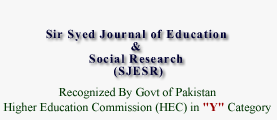Ethical Policy for Sir Syed Journal of Education and Social Research (SJESR)
The ethical policy of SJESR follows the Standard Code of Conduct for Research Integrity. Authors must be honest in presenting their results and conclusions of their research. Research misconduct is harmful to knowledge. It could mislead other researchers.
- Research result
Fabrication, falsification, or selective reporting of data with the intent to mislead or deceive is unethical, as is the theft of data or research results from others. The results of research should be recorded and maintained to allow for analysis and review. Following publication, the data should be retained for a reasonable period and made available upon request. Exceptions may be appropriate in certain circumstances to preserve privacy, to assure patent protection, or for similar reasons.
- Plagiarism
Reproducing text from other papers without properly crediting the source (plagiarism) or producing many papers with almost the same content by the same authors (self-plagiarism) is not acceptable. Submitting the same results to more than one journal concurrently is unethical. Exceptions are the review articles. Authors may not present results obtained by others as if they were their own. Authors should acknowledge the work of others used in their research and cite publications that have influenced the direction and course of their study.
- Duplicate submission
Simultaneous submissions of the same manuscript to different journals will not be tolerated. The submitted article will be removed without consideration.
- Corrections and retractions
All authors must inform and cooperate with journal editors to provide prompt retractions or correction of errors in published works. The journal will issue retractions if:
- There is clear evidence that the findings are unreliable, either as a result of misconduct (e.g. data fabrication) or honest error (e.g. miscalculation or experimental error);
- The findings have previously been published elsewhere without proper cross-referencing, permission or justification (i.e. cases of redundant publication);
- It constitutes plagiarism;
- It reports unethical research.
- The journal will issue errata if:
- A small portion of an otherwise reliable publication proves to be misleading (especially because of honest error);
- The author list is incorrect (i.e. a deserving author has been omitted or somebody who does not meet authorship criteria has been included).
- Other forms of misconduct- misrepresentation of interests, breach of confidentiality, lack of informed consent, and abuse of research subjects or materials.
- Minor misdemeanors may not lead to formal investigations, but are just as damaging given their probable frequency, and should be corrected by teachers and mentors.
- Principles of research integrity
- Reliability in ensuring the quality of research, reflected in the design, the methodology, the analysis, and the use of resources.
- Honesty in developing, undertaking, reviewing, reporting, and communicating research in a transparent, fair, full, and unbiased way.
- Respect for colleagues, research participants, society, ecosystems, cultural heritage, and the environment.
- Accountability for the research from idea to publication, for its management and organization, for training, supervision and mentoring, and its wider impacts.
Note:
All manuscripts submitted will be checked for plagiarism (copying text or results from other sources) and self-plagiarism (duplicating substantial parts of the authors’ published work without giving the appropriate references). Plagiarism is not tolerated.
Date: ________________________ Corresponding author’s signature: __________________________





